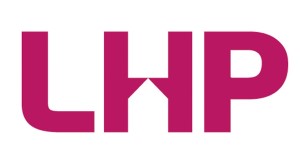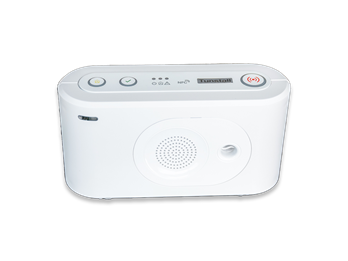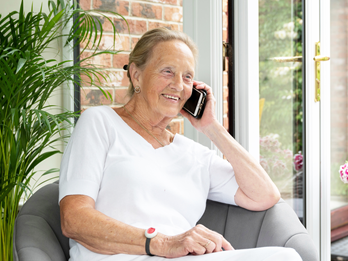TECS is a major part of the way LHP delivers excellent services for all stakeholders and working with Tunstall has helped us to shape our service to become more agile and maximise the opportunities presented by the digital future for both our tenants and colleagues. We are driven by the same customer focused goals and working to achieve the same outcomes.
John O’Hanrahan, Customer Service Centre Manager, LHP
The Challenge
As the UK moves to a digital communications network, LHP has been working to understand the impact on its equipment, services and customers, and evaluate the options available. How has collaborating with Tunstall helped LHP to develop and implement an effective digital strategy that is integrated and inclusive?
What We Did
LHP’s focus for Technology Enabled Care Services (TECS) is on using it effectively to help people to live independently for longer, giving them a better quality of life, and maximising the length of their tenancies to enable continued investment into achieving the organisation’s goals.
LHP has a longstanding relationship with Tunstall, and in recent years they have not only worked closely on a day-today basis, but have also collaborated to prepare a strategy for the UK’s transition to a digital communications network and adapting its services to become more resilient and agile during and post pandemic.
LHP and Tunstall have worked closely together to audit existing schemes and equipment and scope a potential footprint for new technology and service delivery models. The relationship with Tunstall is multi-layered – all touch points within each organisation communicate and collaborate to create excellent service delivery across all elements. As well as working together to improve services to LHP customers, Tunstall has supported LHP’s successful bids to provide TECS to other organisations, and enable initiatives with partners in health and social care.
The Results
The culture change programme has created one LHP team, and this would not have been possible without using technology such as SaaS PNC 8.2 to enable service delivery to be restructured. LHP’s strategy has been created by focusing on outputs, rather than presenteeism, to ensure the right services and processes are in place to deliver the right outcomes.
Remote working has made the service more agile. The ability to work from home means colleagues can cover shifts or peak times more easily as they don’t need to travel, or arrange childcare. This in turn has increased morale, as work/life balance is improved, and aids reduced staff turnover. It has also fostered team spirit – colleagues are more able to help each other out with shift changes or
covering illness as it impacts less upon their life. Operators feel they have more parity with other colleagues now they are able to be partly home-based, making them feel more valued and able to work more closely with colleagues from other areas.
The service is also more robust as a result. Unexpected absence can be covered more easily, reducing the impact on both staff and customers, and staffing levels can be flexed according to demand.
The new approach has seen Average Handle Time decrease by around 10%, Average Wait Times reduce by approximately 30% (comparing the last quarter of 2021 to 2020), and even through the introduction of changes to working methods and the pandemic, all installation and TSA targets were met.
LHP’s investment in new technology and systems has also created a platform for work with other organisations, such as providing a telecare service to 1100 South Kesteven District Council residents, working with Tunstall to onboard them to the SaaS platform, and providing a Smart Hub lone worker solution to St Barnabas Hospice.
LHP has also developed partnerships with health. Using Tunstall technology, LHP also provides an end-to-end service with support pathways into Integrated Living and Support teams and the NHS Urgent Community Response teams, creating opportunities to help customers to remain in their properties for longer and avoid unnecessary hospital admissions. Created in partnership with Age UK, the Hospital Avoidance Response Team (HART) offers people up to 72 hours’ support at home when it’s most needed, helping them to build their confidence and regain and retain independence and wellbeing. From January to July 2019 HART:
- Received 821 referrals from hospital discharge and community health teams
- Generated £164,000 hospital bed savings due to admission avoidance
- Generated £186,000 hospital bed savings due to timely hospital discharge
- Provided 659.5 bridging gaps days of support provided to acute settings




